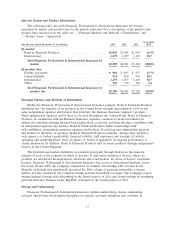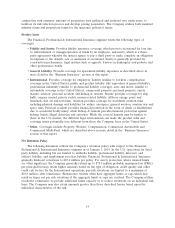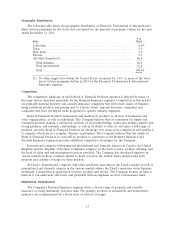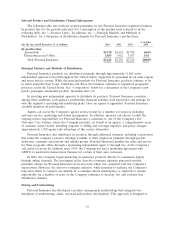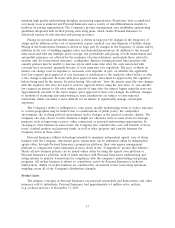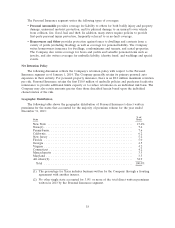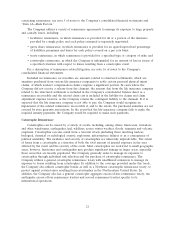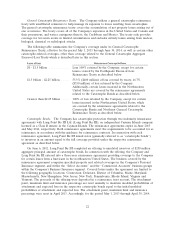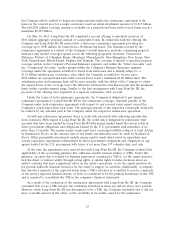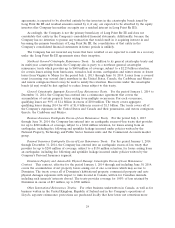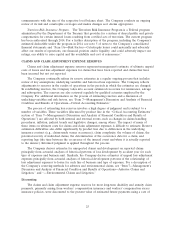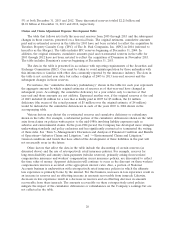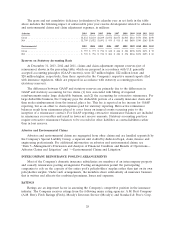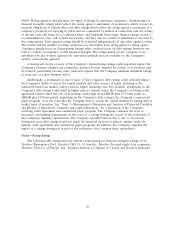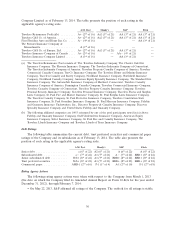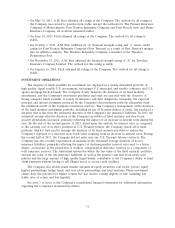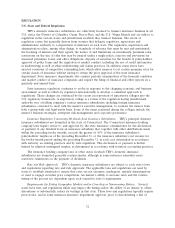Travelers 2013 Annual Report Download - page 33
Download and view the complete annual report
Please find page 33 of the 2013 Travelers annual report below. You can navigate through the pages in the report by either clicking on the pages listed below, or by using the keyword search tool below to find specific information within the annual report.the Company will be entitled to begin recovering amounts under the reinsurance agreement if the
losses in the covered area for a single occurrence reach an initial attachment amount of $1.817 billion.
The full $250 million coverage amount is available on a proportional basis until covered losses reach a
maximum $2.427 billion.
On May 16, 2013, Long Point Re III completed a second offering to unrelated investors of
$300 million aggregate principal amount of catastrophe bonds. In connection with the offering, the
Company and Long Point Re III entered into a three-year reinsurance agreement providing for
coverage up to $300 million for losses from a Northeast hurricane. The business covered by the
reinsurance agreement is a subset of the Company’s overall insurance portfolio, comprising property
insurance and related coverages spread across the following geographic locations: Connecticut,
Delaware, District of Columbia, Maine, Maryland, Massachusetts, New Hampshire, New Jersey, New
York, Pennsylvania, Rhode Island, Virginia and Vermont. The coverage is limited to specified property
coverage written in the Company’s Personal Insurance segment, and within the ‘‘Select Accounts’’ and
the ‘‘Commercial Accounts’’ market groups within the Company’s Business Insurance segment.
Coverage under the agreement is limited to losses from hurricanes and is initially subject to a
$1.25 billion retention per occurrence, after which the Company is entitled to recover up to
$300 million on a proportional basis until covered losses reach a maximum $1.80 billion limit. The
attachment point and maximum limit will be reset annually, with the ability of the Company to adjust
the expected loss of the coverage layer (the difference between the attachment point and the maximum
limit) within a predetermined range. Similar to the first arrangement with Long Point Re III, the
proceeds of the offering were deposited in a separate reinsurance trust account.
Under the terms of both reinsurance agreements, the Company is obligated to pay annual
reinsurance premiums to Long Point Re III for the reinsurance coverage. Amounts payable to the
Company under both reinsurance agreements with respect to any covered event cannot exceed the
Company’s actual losses from such event. The principal amount of the respective catastrophe bond will
be reduced by any amounts paid to the Company under the respective reinsurance agreement.
As with any reinsurance agreement, there is credit risk associated with collecting amounts due
from reinsurers. With regard to Long Point Re III, the credit risk is mitigated by reinsurance trust
accounts that have been funded by Long Point Re III with money market funds that invest solely in
direct government obligations and obligations backed by the U.S. government with maturities of no
more than 13 months. The money market funds must have a principal stability rating of at least AAAm
by Standard & Poor’s on the issuance date of the bonds and thereafter must be rated by Standard &
Poor’s. Other permissible investments include money market funds which invest in repurchase and
reverse repurchase agreements collateralized by direct government obligations and obligations of any
agency backed by the U.S. government with terms of no more than 397 calendar days, and cash.
At the time the agreements were entered into with Long Point Re III, the Company evaluated the
applicability of the accounting guidance that addresses variable interest entities or VIEs. Under this
guidance, an entity that is formed for business purposes is considered a VIE if: (a) the equity investors
lack the direct or indirect ability through voting rights or similar rights to make decisions about an
entity’s activities that have a significant effect on the entity’s operations, or (b) the equity investors do
not provide sufficient financial resources for the entity to support its activities. Additionally, a company
that absorbs a majority of the expected losses from a VIE’s activities or is entitled to receive a majority
of the entity’s expected residual returns, or both, is considered to be the primary beneficiary of the VIE
and is required to consolidate the VIE in the company’s financial statements.
As a result of the evaluation of the reinsurance agreements with Long Point Re III, the Company
concluded that it was a VIE because the conditions described in items (a) and (b) above were present.
However, while Long Point Re III was determined to be a VIE, the Company concluded that it did not
have a variable interest in the entity, as the variability in its results, caused by the reinsurance
23


